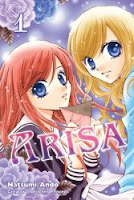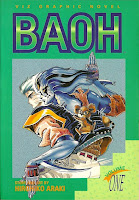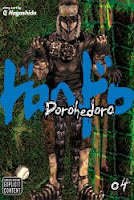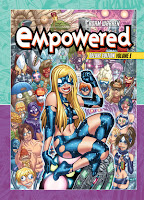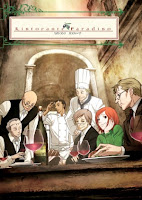Support manga, support your library!
Here’s what I’ve been reading:
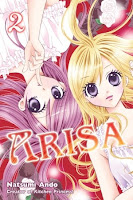 Arisa, Volumes 2-4 by Natsumi Ando. I found the first volume of Arisa to be quite intriguing and darker than I expected, and so I was looking forward to continuing the series. As much as I enjoyed these volumes, they also frustrated me. They are very engaging and make for quick reading, but not much seems to have actually happened. As many twists and turns as Ando packs into each volume, and there are a lot, somehow the plot as a whole seems to be progressing very slowly. It’s an odd sort of dissonance. Tsubasa continues to investigate the mystery surrounding her sister Arisa’s attempted suicide and the strange ritual known as “King Time.” She has some help, but it’s becoming more and more difficult to tell who’s an ally.
Arisa, Volumes 2-4 by Natsumi Ando. I found the first volume of Arisa to be quite intriguing and darker than I expected, and so I was looking forward to continuing the series. As much as I enjoyed these volumes, they also frustrated me. They are very engaging and make for quick reading, but not much seems to have actually happened. As many twists and turns as Ando packs into each volume, and there are a lot, somehow the plot as a whole seems to be progressing very slowly. It’s an odd sort of dissonance. Tsubasa continues to investigate the mystery surrounding her sister Arisa’s attempted suicide and the strange ritual known as “King Time.” She has some help, but it’s becoming more and more difficult to tell who’s an ally.
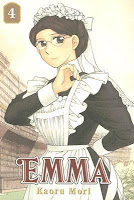 Emma, Volumes 4-6 by Kaoru Mori. I’m a little heartbroken that I missed this series when it was first being published. Emma is absolutely wonderful and unfortunately very out of print. Mori’s attention to historical detail is fantastic and her artwork is gorgeous. She has really captured Victorian-era England and has created an immersive setting. By this point in Emma, the series has left its episodic roots behind in favor of an increasingly involved (but not overly complicated) romantic storyline. It seems that whatever happens as a result of their love, it won’t be easy for either Emma or William. Because of their class differences, pursuing their relationship will have consequences not only for themselves, but for their families and acquaintances as well.
Emma, Volumes 4-6 by Kaoru Mori. I’m a little heartbroken that I missed this series when it was first being published. Emma is absolutely wonderful and unfortunately very out of print. Mori’s attention to historical detail is fantastic and her artwork is gorgeous. She has really captured Victorian-era England and has created an immersive setting. By this point in Emma, the series has left its episodic roots behind in favor of an increasingly involved (but not overly complicated) romantic storyline. It seems that whatever happens as a result of their love, it won’t be easy for either Emma or William. Because of their class differences, pursuing their relationship will have consequences not only for themselves, but for their families and acquaintances as well.
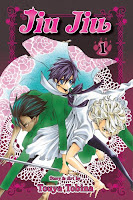 Jiu Jiu, Volumes 1-2 by Touya Tobina. I ended up liking Jiu Jiu much more than I expected. Takamichi becomes the next heir in a family of Dark Hunters, responsible for killing demons, when her twin brother dies protecting her. Soon after, Snow and Night, part demon themselves, become her jiu jiu, aiding in her hunts. This is a fairly dark setup, but Jiu Jiu is unexpectedly fun and funny. The darker elements still show up, but don’t completely mesh yet. Snow and Night are delightfully endearing. They’re shape-shifting wolves, but maintain their dog-like personalities even when in human form: they’re loyal and excitable and love frisbees and walks. Left to their own devices, they also tend to wander around naked.
Jiu Jiu, Volumes 1-2 by Touya Tobina. I ended up liking Jiu Jiu much more than I expected. Takamichi becomes the next heir in a family of Dark Hunters, responsible for killing demons, when her twin brother dies protecting her. Soon after, Snow and Night, part demon themselves, become her jiu jiu, aiding in her hunts. This is a fairly dark setup, but Jiu Jiu is unexpectedly fun and funny. The darker elements still show up, but don’t completely mesh yet. Snow and Night are delightfully endearing. They’re shape-shifting wolves, but maintain their dog-like personalities even when in human form: they’re loyal and excitable and love frisbees and walks. Left to their own devices, they also tend to wander around naked.
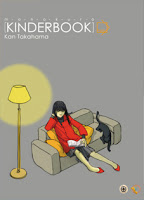 Monokuro Kinderbook by Kan Takahama. With a background in contemporary art and later becoming a part of the Nouvelle Manga artistic movement, Takahama made her manga debut in the alternative manga magazine Garo with the story “Women Who Survive.” That story and nine others (some if not all of which were also published in Garo) are collected in Monokuro Kinderbook. The stories, though unrelated, all tend towards the darker, messier side of life. This is emphasized by Takahama’s artwork, which I love. Her style is reminiscent of ink wash painting. What particularly stands out to me about her stories are their realism; Takahama doesn’t go for the easy endings. Some of the pieces in Monokuro Kinderbook also incorporate autobiographical elements.
Monokuro Kinderbook by Kan Takahama. With a background in contemporary art and later becoming a part of the Nouvelle Manga artistic movement, Takahama made her manga debut in the alternative manga magazine Garo with the story “Women Who Survive.” That story and nine others (some if not all of which were also published in Garo) are collected in Monokuro Kinderbook. The stories, though unrelated, all tend towards the darker, messier side of life. This is emphasized by Takahama’s artwork, which I love. Her style is reminiscent of ink wash painting. What particularly stands out to me about her stories are their realism; Takahama doesn’t go for the easy endings. Some of the pieces in Monokuro Kinderbook also incorporate autobiographical elements.

